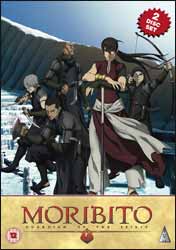|
Click here to return to the main site. DVD Review
Shuga and Shaman Torogai both embark on their own quests to determine the true nature of the Water Spirit, each risking their lives against very different threats. Facing starvation locked in a secret vault, Shuga comes to the same shocking conclusion as Torogai, and learns the real tragic future of Chagum. Meanwhile, the Hunters find Balsa, putting everyone in immediate peril. Balsa is forced to flee, but Chagum won't leave after learning what's happened to his brother back in the royal palace! Torn between his two lives, Chagum is lost as the torch comes down on his new home... At the end of the first volume of Moribito, we left the spear-wielding bodyguard Balsa in turmoil after being forced to fight an old adversary to the death, putting her oath of protection in jeopardy. The story wastes no time, though, in turning back from this unsettling course of events to the main plotline, namely the enigmatic water-spirit germinating inside Balsa's young charge, Prince Chagum, and the converging efforts of the various characters to learn its secrets. The resourceful old shaman Torogai endures a terrifying set of ordeals at the mercy of elemental spirits while she bargains for information at a nexus of realities deep below the earth; meanwhile the young astrologer Shuga places his own life in similar danger as he navigates the hazardous politics of the court, seeking to gain access to the hidden historical records showing that the nation's founding myth is drastically misleading propaganda. While Moribito continues to impress in its second volume with its unparalleled production values and direction, the series' real strength lies in the choices made in world-building and characterisation that push a slightly formulaic fantasy story towards something truly memorable. With the exception of the extended flashback detailing Balsa's harsh upbringing with the warrior Jiguro - a story noticeably free of the easy sentiment usually found in surrogate-parent storylines in anime - most of the character development takes place through people's deeds and words rather than exposition, particularly in the case of the Hunters pursuing Balsa and Chagum who continue to be interesting and distinctive while remaining the implacable, duty-bound men they are. The secondary characters aren't neglected: the heartbreak of the astrologer Gazai, Tanda's struggle to express his feelings for Balsa and the grief the messenger Toya feels at being tricked into betraying his friends are all conveyed economically and not casually set aside for the sake of further advancing the plot. The fantasy country of Shin-Yogo is portrayed with more care than expected, too: when the protagonists seek the aid of the indigenous Yakoo people for knowledge of the otherworldly threat facing Chagum, the picturesque native folk in question turn out not to be simple-hearted keepers of pastoral ancient wisdom, but nuanced modern people who care more about everyday life than tradition. It's this kind of determination not to take the easy road that makes Moribito something special. As the series draws to its close the plot threads converge and move to a mystical finale that while a little too reminiscent of the apocalyptic final-boss battles that end most Japanese role-playing games, is nonetheless memorably portrayed and relies on the efforts of every character rather than a single magically plot-solvent deus ex machina. The real story - the bittersweet, ambiguous relationship between Balsa and Chagum, complicated by responsibility and the characters' pasts - is what director Kenji Kamiyama wisely chooses to focus on at the series' end, and the feelings portrayed are as heart-rending for the viewer as they are for the characters. While the series as a whole continues to owe an overwhelming debt to Hayao Miyazaki's landmark Princess Mononoke, it's great to be able to pay Kamiyama and staff the compliment of saying that they clearly understand just what made that film and its characters great - no villains, no easy solutions, no simple-minded opposition of nature and humanity, and an ending that's satisfying without being comforting or cosy. It's a delight of a series for anyone looking for high quality fantasy. 9 Richard Hunt |
|---|

